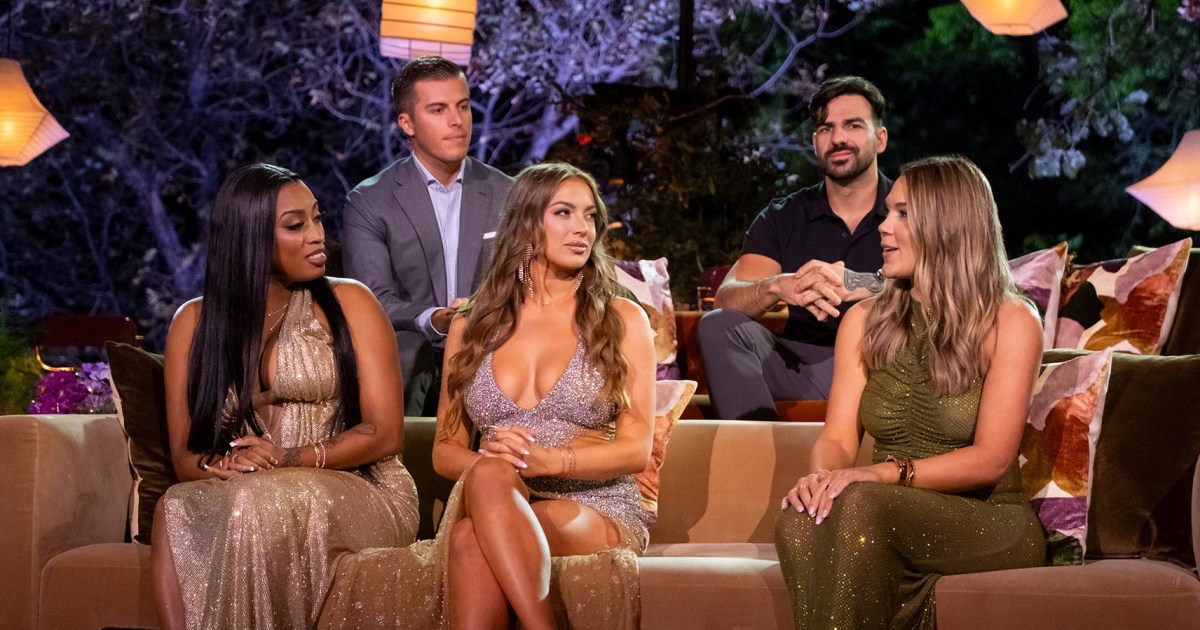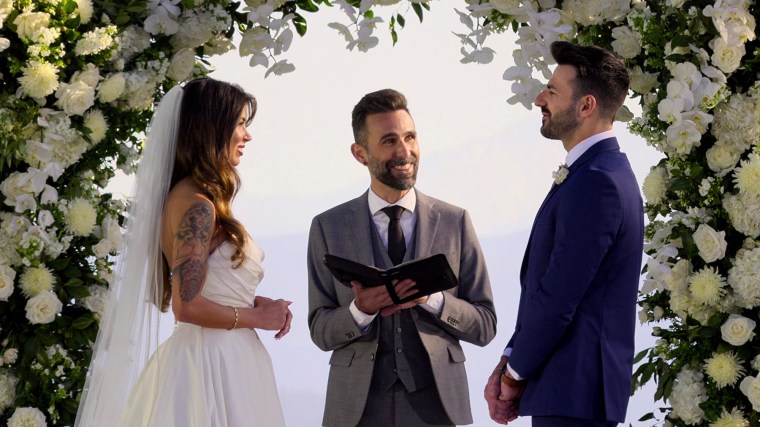
Why some fans say they’ve soured on Netflix’s dating show
Not one couple who met during season nine of “Love Is Blind” had a fairy-tale ending, a shocking conclusion that has made some fans question whether the dating show is worth their time.
When the series debuted on Netflix in February 2020, viewers gravitated toward its refreshing premise: Can people fall for each other without seeing each other? The idea especially resonated with people who were starting to feel isolated as the Covid-19 pandemic began to take hold.
From their isolated “pods,” contestants speed date each other, engaging in hourslong raw conversations that sometimes can lead to proposals within days of their “meeting.” Netflix then has the lovebirds test whether they actually mesh in person. The journey ultimately leads some of the couples to the altar, where they are tasked with saying yes or no to their matches after just weeks of knowing each other.
But the absence of genuine romance this season, coupled with several controversies over the past few years, has fueled disdain for the series from some fans who say the show has become unwatchable.
“I think the series has lost its spark, the reason it was created,” said Kadidjha Traore, who was among the many fans who posted about their disappointment on TikTok. She cited the success of season one fan favorites Lauren Speed-Hamilton and Cameron Hamilton, whom she described as “the poster child of loving being blind.”
However, as the seasons went on,” Traore said, the show “kind of has deteriorated.”
Dating shows continue to vie for viewership in an oversaturated market for such programming. Ratings for the long-running “Bachelor” franchise and its numerous spinoffs have waned amid criticism for being too stale. Even highly popular shows like “Love Is Blind” (both the U.S. and U.K. versions) have faced intense scrutiny from fans over how they have handled cyberbullying of contestants and their mental health.
“Love Is Blind” hasn’t faced a dip in viewership during its five-year run. Each season, which has taken place in a different U.S. city, has continued to maintain a spot in the most-viewed rankings on Netflix after it drops. The season eight premiere this year generated 1.07 billion viewing minutes in the United States for the week of Feb. 10-16, according to Nielsen. (Viewing numbers for the latest season aren’t yet available.)
However, many viewers online have complained that the show no longer lives up to the premise that captivated them. On the Reddit page dedicated to the show, fans have analyzed the ninth season’s trajectory across hundreds of comments in more than a dozen threads. TikTok users have also dissected the couples in their videos, some of which have racked up millions of views and thousands of likes.
A representative for Netflix didn’t immediately respond to a request for comment.
Keeping viewers engaged is part of the challenge of reality TV, according to Claire Fallon and Emma Gray, co-hosts of the “Love To See It” podcast, which covers other pop culture topics.
“The thing about a reality television show is that while producers can intervene and do a lot to shape that narrative, you are still dealing with real people at the end of the day,” Gray said. “And you’re going to get what you can get and have to make do with what was felt.”
Fallon said: “There’s something that’s very straightforward about making a reality dating show, right? Like, you don’t need to write scripts or, you know, get people in costume, and, like, it’s low-budget and it’s a pretty simple formula.”
“A lot of fans understandably want a season that has good drama, a couple of villains and then at least one love story that’s sort of uplifting that makes them feel inspired and like they can live through the romantic happiness of the people in that relationship,” Fallon added. “And if you don’t have all of those components really firing on all cylinders, especially when people have such high expectations of a show, people are going to start to feel disappointed with the product.”
But that’s a production feat that’s “hard to nail in practice,” she said.
“Love Is Blind” has received blowback in past seasons, with viewers taking issue with the show’s having technical challenges, short-lived marriages and secret relationships. The candidates’ political beliefs have also sometimes prompted wider discourse surrounding whether ideological differences can still be a deal-breaker when it comes to love.
This season, which took place in Denver, fans appeared especially frustrated by the casting choices. Several online questioned the motivation and maturity of those selected for this season, as well as whether their backgrounds (and their dating histories) were actually vetted.
As with other reality shows, many contestants from “Love Is Blind” have gone on to become influencers and podcasters following their appearances after having gained notoriety and audience on social media.

“People can use the show to launch other projects to launch their careers, and that’s not something you can really get around, because that is kind of the attention economy that we live in,” Gray said.
A storyline that drew a lot of negative reactions involved contestant Patrick Suzuki, who was turned down by his match, Kacie McIntosh. She ended their engagement shortly after they met in person. McIntosh told Suzuki it was because she couldn’t do the show anymore, but to the cameras she said it was because she didn’t think her “attraction to him” would “grow.” (Suzuki is Asian American, and McIntosh said she’d never dated anyone of his ethnicity before.)
Contestants Nick Lancaster and Annie Lancaster also garnered backlash after their discussion in the pods about what they would do if their future kids were gay. Amato said he feels being part of the LGBTQ community is a “fad” (he has since apologized on his Instagram account), and Lancaster said she wouldn’t be thrilled.
“I watch these reality shows to escape,” Traore said. “I like all those shows just to not think about what’s going on right now. But this season of ‘Love Is Blind,’ like, really just brought you back into it.”
Rikkii Wise, who has amassed a following of about 200,000 people on TikTok, where she posts “tea” (or gossip) related to reality shows, said she actually enjoyed that there were “mess and drama” rather than romance. But she understands the fan complaints — of the five featured couples, three broke up before the altar, meaning just two weddings were shown on screen.
“Obviously you can’t force people to go to the altar, but I think that maybe they should bring that clause back, because if we had no couples go to the altar, the audience is going to be in an uproar,” said Wise, who goes by storytimewithrikkii on social media.
The season nine reunion airs at 9 p.m. ET (6 p.m. PT). Wise, who has posted speculation about what will go down in the episode, said she doesn’t believe love is blind, even after having watched every season.
“People have found love on the show,” she said. “People are still married; people do have babies. And I don’t think it’s about love being blind. I think it’s about, OK, these people really wanted to get married, they found each other, and they are attracted to each other, you know?”
The creator of “Love Is Blind” maintains that the experiment worked as intended.
“In Season 9, at least one member of each couple felt their love was not strong enough to overcome the challenges of the real world, and they chose not to get married,” Chris Coelen told Netflix’s publication, “Tudum.” “That’s exactly how the experiment is supposed to work, so I would say not only is the experiment working, I think it’s working better than ever.”
First Appeared on
Source link






